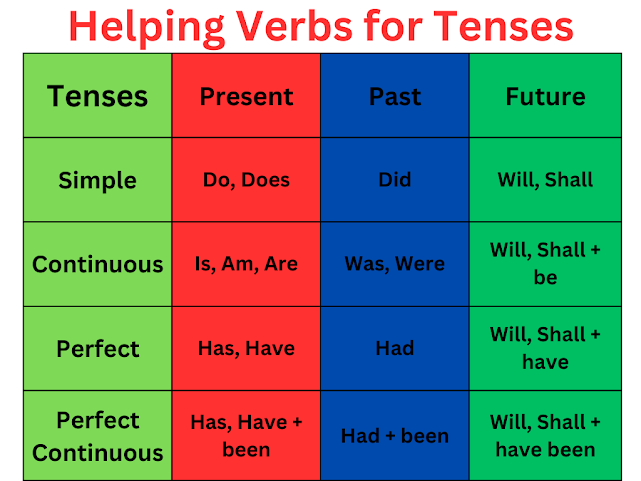Definition of Verb
A verb is a word that tells us what someone or something is doing, what happened, or what they are like. It's an important word in a sentence that shows the main action. Verbs are like the boss of a sentence and help us understand how things in the sentence are connected. There are four kinds and four forms of verbs.
Definition of Verb in Hindi/Urdu
Verb us word ko kehte hen jo hame batata hai ke kisi ne kya kaam kiya ya kya kaam hua. Verb kisi kaam ke hone ya kisi halat ke bare me batane ke liye istemaal hota hai. Verb kisi bhi jumle me khaas ehmiyat rakhta hai verb k bina koi jumla mukammal nahi ho sakta. Verb ki chaar types aur chaar forms hen.
Types of Verbs
- Action Verbs
- Helping Verbs
- Linking Verbs
- Modal Verbs
Action Verbs:
Action verbs are a type of verb that express physical, mental, or emotional actions performed by the subject of a sentence. They describe what the subject is performing or what action is taking place. Action verbs are active and vivid, which helps the reader visualize the action described in the sentence.
Examples of Action Verbs:
- He runs an academy.
- She drives a car.
- I think about my future.
- They believe in themselves.
- We appreciate your efforts.
- Everyone loves his family
Action Verbs in Hindi/Urdu:
Action verbs verb ki wo type hote hen jo hame batate hen ke kaam karne wale ne kya kaam kia chahe wo kaam zahiri ho, mansik ho, ya jazbaati ho.
Examples of Action Verbs in Hindi/Urdu:
- Wo ek academy chalata hai.
- Wo gari chalati hai.
- Me apne bhavishya ke bare me sochta hoon.
- Wo khudpe yaqeen rakhte hen.
- Hum tumhari koshis ki tareef karte hen.
- Har koi apne parivaar se pyar karta hai.
Helping Verbs:
The verbs that are used with the main verb as helper to form different verb tenses, moods, and voices are called Helping Verbs also known as Auxiliary verbs. In negative sentences helping verbs are used with “not”. Examples: is, am, are, have, and will. etc.
Examples of Helping Verbs:
- He is walking in the park.
- I did not do anything.
- She has completed her work.
- What are you talking about?
- We were playing outside.
- They do not know about that.
Helping Verbs in Hindi/Urdu:
Helping verb main verb ke sath helper ki tarah use hote hen. Ye dusre verb k sath mil ke hame us jumle ka tense batane me madad karte hen. Helping verb ko Auxiliary verb bhi kaha jayta hai.
Linking Verbs:
The verbs that connect the subject of the sentence to a subject complement (could be an adjective, a noun, or a pronoun) that describes or identifies the subject are called Linking Verbs also known as state verbs. Examples: is, am, are, was, were, will be, shall be, etc.
Examples of Linking Verbs:
- She is a doctor.
- You were busy yesterday.
- They all are my friends.
- He was very angry.
- I shall be happy there.
- You are the one who I love a lot.
Linking Verbs in Hindi/Urdu:
Linking verb wo verb hote hen jo kisi sentence ke subject (kaam karne wala) ko ki dusre noun, pronoun ya adjective se link karta hai. Ye verb subject ki haalat (state) ke bare me batate hen. Linking verb ko state verb bhi kaha jata hai. Examples: is, am, are, was, were, will be, shall be, etc.
Examples of Linking Verbs in Hindi/Urdu:
- Wo ek doctor hai.
- Tum kal masroof they.
- Wo sab mere dost hen.
- Wo bohet gusse me tha.
- Main wahan khush honga.
- Tum wo ho jis se main bohot pyar karta hoon.
Modal Verbs:
Modal Verbs express the possibility, necessity, permission, recommendation, obligation, promise, or ability of the subject. They are used with the base form of the main verb. Examples: can, could, should, would, may, must etc.
Examples of Modal Verbs:
- I can do it easily. (Ability)
- It may rain tonight. (Possibility)
- May I come to the class? (Permission)
- You should complete the task. (Recommendation/Obligation)
- She must finish her assignment on time. (Strong obligation)
- We would win the match. (Promise)
Modal Verbs in Hindi/Urdu:
Modal verbs zahir karte hen sambhavna, zaroorat, ijazat, waada, hukum, darkhwast ya subject ki koi kaam karne ki shamta ko. Ye hamesha verb ki basic form ke sath use hote hen.
Examples of Modal Verbs:
- Main ye aasani se kar sakta hoon.
- Aj raat barish ho sakti hai.
- Kya me class me aa sakta hoon?
- Tumhe ye kaam pura karna chahiye.
- Usey apna assignment waqt pe zaroor pura karna chahiye.
- Hum ye match zaroor jeetenge
- Main ye aasani se kar sakta hoon.
- Aj raat barish ho sakti hai.
- Kya me class me aa sakta hoon?
- Tumhe ye kaam pura karna chahiye.
- Usey apna assignment waqt pe zaroor pura karna chahiye.
- Hum ye match zaroor jeetenge
Forms of Verbs
There are four forms of verbs usually called a verb's first, second, and third forms. These are also known as the base form, the past simple form, and the past participle form, respectively. Let's define each of these forms:
Forms of Verbs
1. Basic Form of Verb (1st Form):
2. Past Simple form of Verb (2nd Form):
3. Past Participle form of Verb (3rd Form):
Definition: The past participle form of a verb is used in various tenses, including the past perfect tense and passive voice. It is also used as an adjective. This form is used in all perfect tenses.
Here's an example of how these forms are used in sentences:
- Base Form: "I like to eat pizza."
- Past Simple Form: "Yesterday, I ate a whole pizza."
- Past Participle Form: "The pizza was eaten by the children."
4. Present Participle form of Verb (4th Form):
Examples:
- Running (present participle) can be exhausting.
- She is singing (present participle) beautifully.
- They were swimming (present participle) in the pool.























0 Comments